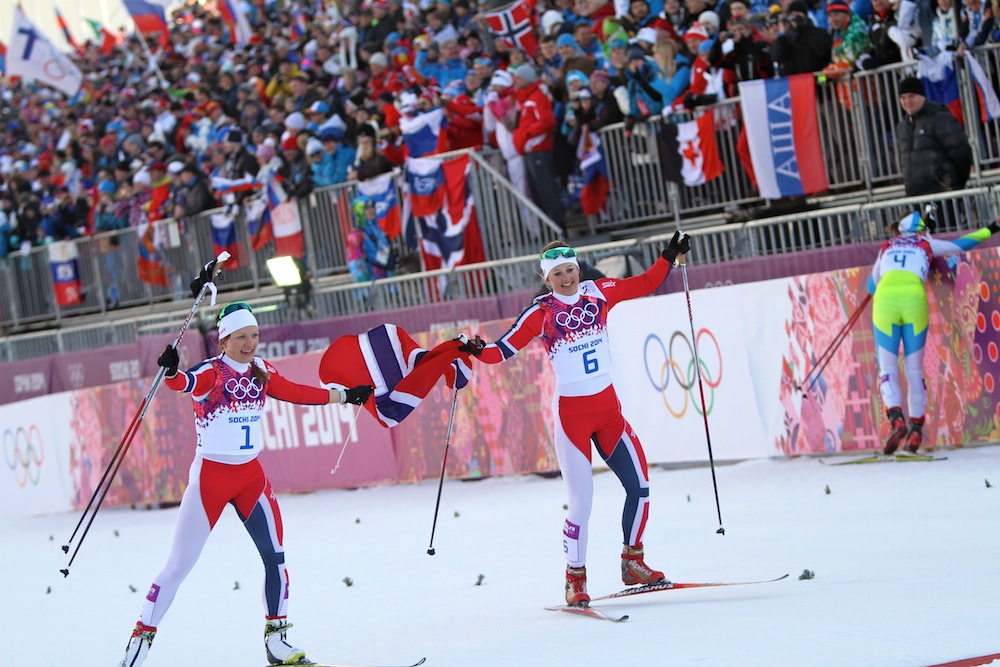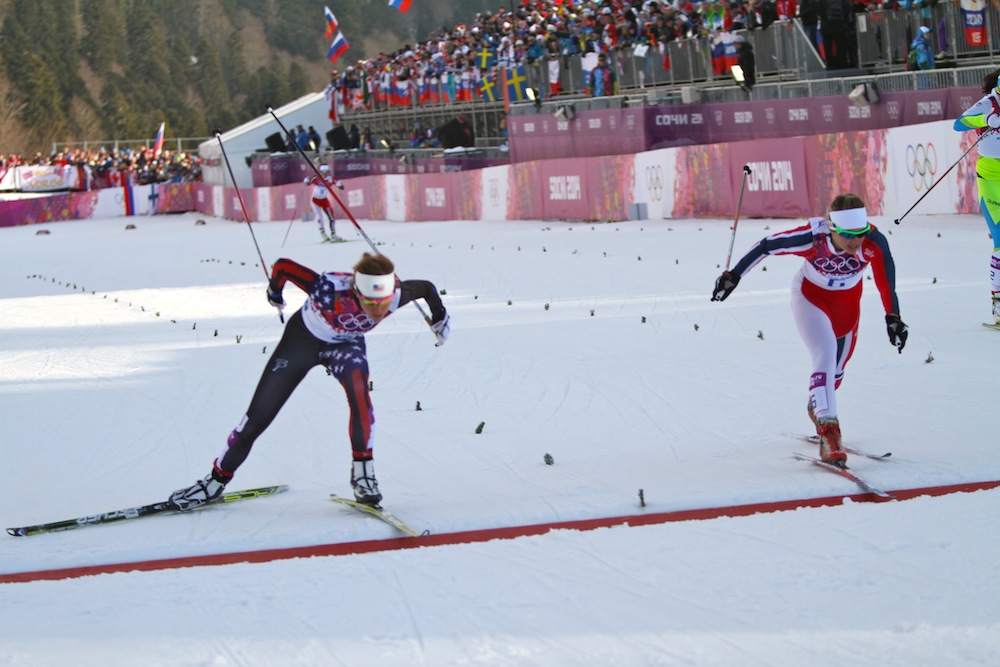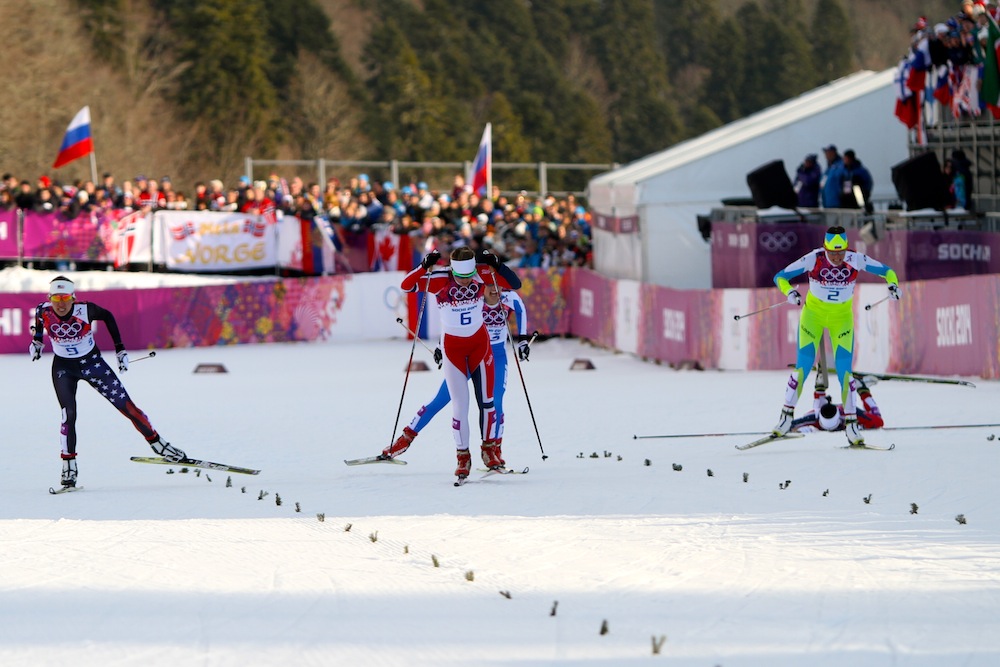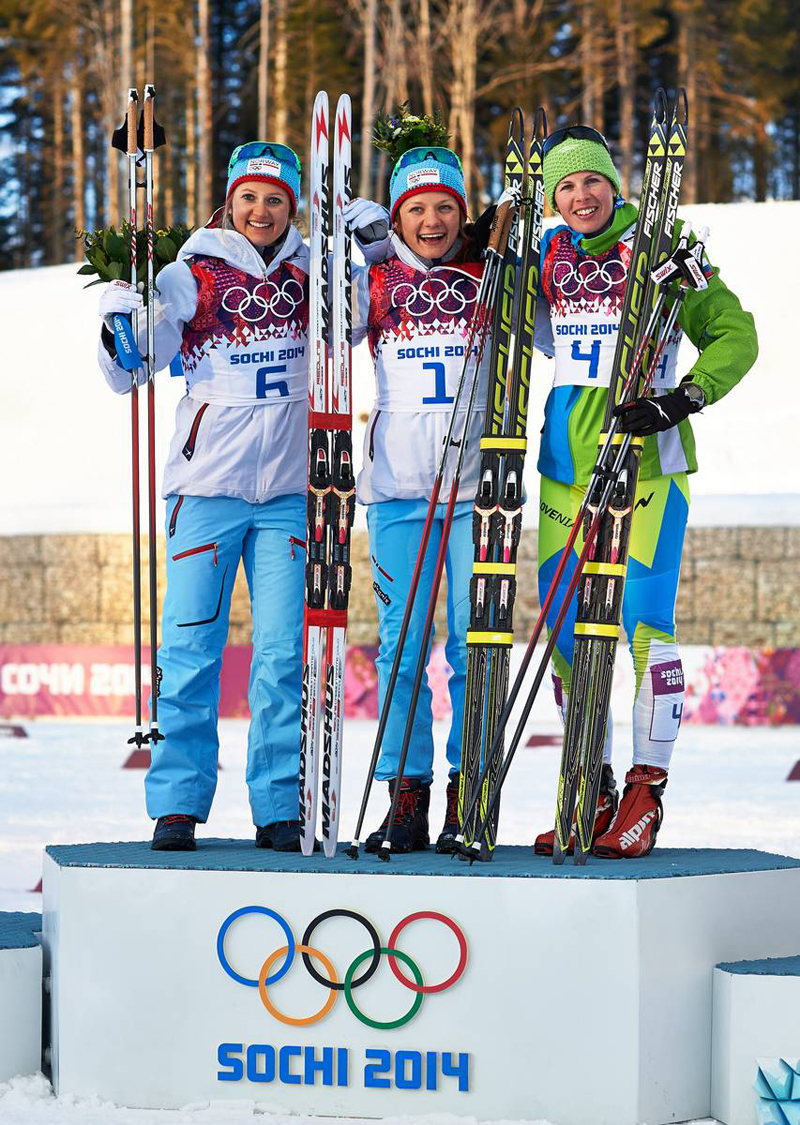
FasterSkier’s coverage is made possible through the generous support of Rudy Project.
SOCHI, Russia — Tuesday’s Olympic freestyle sprint was more about survival than tactics, more about crashes and carnage than grace and finesse.
But some people managed to stay on their feet and ski fast at the same time on the soft and, in some places, salted snow, and at least three of them were Norwegian.
No, not Marit Bjørgen, the all-around favorite at this Olympics.

Not Kikkan Randall either, who was eliminated in a surprising turn of events in her quarterfinal, where she went from first to fourth between the last corner and the finish, then missed out on third in a photo finish that would’ve advanced her to the semifinals.
The masters of sprinting on sugary snow turned out to be 23-year-old Norwegian teammates and friends, Maiken Caspersen Falla and Ingvild Flugstad Østberg, who won gold and silver, respectively, in the women’s 1.3-kilometer sprint.
“My tactic was to stay in the front because so much can happen in sprints and I have learned that the hard way,” Falla said in a post-race press conference. “I get trouble because of other peoples skis or poles. … The people in front of you decide how your race will turn out.”
Slovenia’s Vesna Fabjan took bronze in the photo finish for second, two-hundredths of a second behind Østberg and 0.4 behind Falla, who won the final for her first Olympic medal in 2:35.49.
Fabjan’s result matched that of former Slovenian skier Petra Majdič, who placed third in the 2010 Olympic classic sprint and retired in 2011.
“I think it’s a great achievement for our team,” Fabjan, 28, said of her first Olympic medal. “We weren’t so great organized before; it was everything around Petra and after she retired the sport is on us. I think we showed to the world that Slovenia is not just Petra Majdič.
“We are much more connected than before,” she elaborated. “We are also like a big family supporting each other. We were working for this medal so hard. This medal is not just mine but it’s from all team.”
Another Norwegian, Astrid Uhrenholdt Jacobsen, placed fourth (+1.82) less than a week after her brother died unexpectedly last Friday. She broke a pole after tangling with American Sophie Caldwell on a tight corner at the top of the course, but came back for her second-best sprint result of the season in her first race of the Olympics.

Sweden’s Ida Ingemarsdotter passed Caldwell and placed fifth (+6.55) and Caldwell finished 5.7 seconds later in sixth for the best U.S. Olympic women’s result of all time in cross-country skiing.
Earlier in the afternoon, with temperatures well above freezing, Falla won the qualifier by 0.4 seconds over Fabjan, and Bjørgen followed in third (+1.1). Randall had qualified in 18th behind her U.S. teammates Caldwell in ninth and Jessie Diggins in 12th.
Caspersen went on to win the first quarterfinal by 0.78 seconds over Sweden’s Stina Nilsson, as did Østberg, who edged Ingemarsdotter in a photo finish for first in the third quarterfinal. Jacobsen won the second quarterfinal by 0.21 seconds over Fabjan, and Fabjan’s teammate, Katja Visnar, won the fourth quarterfinal, 0.76 seconds ahead of Caldwell. Diggins was third in that heat, eight-hundredths of a second back, narrowly missing out on the semifinals.
The fifth quarterfinal could’ve easily been mistaken for a final, with Bjørgen, Randall and Germany’s Denise Herrmann squaring off, along with Finland’s Mona-Liisa Malvalehto, Canada’s Perianne Jones, and Italy’s Gaia Vuerich.
Randall took charge on the pivotal climb out of the stadium then lost steam in the finishing straight, as Herrmann and Bjørgen unleashed their energy reserves to take first and second ahead of her. Vuerich lunged ahead of Randall as well, placing third by 0.05 seconds to capture the last lucky loser spot that went with it.
Falla went on to win the first semifinal by 0.22 seconds, after Fabjan nearly caught her on the downhill with a slingshot that rocketed the Slovenian to second. Ingemarsdotter sprinted up to challenge Fabjan for second, and ended up third by three-hundredths of a second. Jacobsen finished 0.3 seconds later in fourth, and all four advanced to the final.

Østberg led Caldwell and Visnar up the first hill in the second semifinal, where Caldwell tucked into second. The order held all the way back to the stadium, while Bjørgen struggled to find room to come from behind.
Herrmann took the lead early in the finishing stretch while Vuerich and Visnar followed. Østberg and Caldwell caught up along the horseshoe-shaped flat for a five-way fight to the finish while Bjørgen stumbled in last, falling flat on her stomach.
“I have bad start and cannot find my [position],” Bjørgen told NRK, according to a translation. “There was fighting all the way, and finally it ends with a fall.”
Østberg clinched first, 0.01 seconds ahead of Caldwell in second, and Vuerich again placed third (+0.21), not enough to advance the finals for seventh overall. Herrmann finished fourth in (+0.28), nearly a second ahead of Visnar in fifth. Bjørgen came through in sixth, nearly 16 seconds after Østberg.
In the final, Caldwell in her debut Olympics said she was “thrilled to be there.”
“I definitely wasn’t expecting that coming into today, so it exceeded any expectations that I had,” the 23-year-old Vermont native said.
Falla and Fabjan led out of the start while Østberg stayed close in third. With a sharp righthand corner leading into the big climb, Ingemarsdotter and Caldwell hung close around fourth and fifth, while Jacobsen was just off the back in sixth.
The front free broke away slightly down the backside of the hill, and remained in order until the S-turn final descent. Jacobsen pushed hard to make up significant ground on the leaders, nearly reining them in before the finish.
Falla pressed on and outlasted her competition for gold in her second Olympics. Just 0.38 seconds behind, Østberg beat out Fabjan by two-hundredths of a second for silver.
Together, Falla and Østberg notched Norway’s 100th gold medal in cross-country and their nation’s first 1-2 finish at the 2014 Winter Games.
“It’s a little coincidence,” Falla said. “We’re coming from a great winter sport nation and it’s a really big part of that heritage.”
“It’s great to win with Maiken,” Østberg added. “We’ve been training for so many years and we’re at the same age and still young, proud to be norwegian today.”
With three women in the top four and a men’s winner in Ola Vigen Hattestad, it was the kind of day Norway needed four days after Jacobsen’s family tragedy.
“It’s definitely been some hard days for the Norwegian team, but Astrid showed today that she’s really strong and I’m extremely proud of her,” Falla said. “She really pulled herself together … it’s bad that she broke a pole in the final because she also could get a medal. I’m proud of her and I’m proud of the team and I hope we have encouraged her to do a good sprint today.”
Adding to the excitement for Falla, she got to meet the Crown Prince of Norway, Haakon Magnus. According to NRK, he said he pinned her as the winner from the first round.
“I had absolutely wonderful skiing; the best ever!” Falla replied, according to a translation.
“It feels like I have fallen from the moon and it’s so great to share the day with my good friend Ingvild and other supporters,” she added.
“I have said that the goal is a medal,” Østberg told NRK. “I’m absolutely ecstatic and cannot believe it.”
— Nat Herz and Chelsea Little contributed reporting

Alex Kochon
Alex Kochon (alexkochon@gmail.com) is a former FasterSkier editor and roving reporter who never really lost touch with the nordic scene. A freelance writer, editor, and outdoor-loving mom of two, she lives in northeastern New York and enjoys adventuring in the Adirondacks. She shares her passion for sports and recreation as the co-founder of "Ride On! Mountain Bike Trail Guide" and a sales and content contributor at Curated.com. When she's not skiing or chasing her kids around, Alex assists authors as a production and marketing coordinator for iPub Global Connection.



